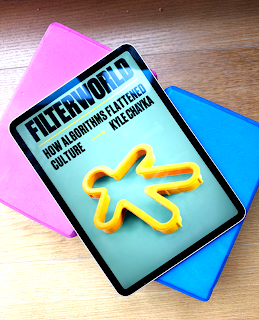Filterworld: How Algorithms Flattened Culture by Kyle Chayka: nonfiction review
Filterworld: How Algorithms Flattened Culture by Kyle Chayka
Overall: 5
I read a lot of books about social media and the internet and even more articles on the topic. I am fascinated by the internet. Despite knowing the topic well and being familiar with many of the book's anecdotes like Mechanical Turk story that opens it, I still found Filterworld fascinating and a worthy read. If you are going to read one book about the internet, let it be this one.
Filterworld focuses on algorithms and their increasing presence in our lives (even social media wasn't always completely algorithmically driven; anyone remember Tumblr?) and the insidious side of that both on and offline. Charting everything from TikTok's all knowing For You Page to your Netflix recommendations, Chayka gets to the heart of what these algorithms seem to do and what the tangible results are. For instance, many algorithms aren't as deeply personalized as they seem and simply push what's already popular your way. The ubiquity eventually wears you down, leading to algorithms flattening unique taste.
He takes the reader on a journey into how data-driven choices and algorithmically influenced taste have altered both our online and physical worlds. From the design of cafes catering to being Instagrammable (and what makes something Instagrammable in the first place) to which books become popular on places like BookTok to what movies, music, and art are prioritized, he makes a strong case that the worlds crafted online have implications even for those who never get on the internet.
Beyond the quip that the television series Normal People missed its moment arriving only after Tumblr banned born (Chayka argues it was made to GIF), what stuck with me most from this book is the idea that human curators and tastemakers that are wildly important to culture are getting pushed out by robots and algorithmic systems that don't challenge or expand our minds but cater simply to the lowest common denominator. There's conversations with museum curators and a long meditation on the importance of DJs at college radio stations that made my heart twist at what we're losing when people are no longer at the helm of guiding others to the best of what the arts has to offer. I also just love the validation that both social media and the internet in general has gotten much worse for users in the last 5 or so years with concrete reasoning to back up my uneasy feeling.
Whether you're on the internet or not–but especially if you do spend any amount of time on social media or even scrolling through Amazon–this is an important read. If nothing else, we should be aware of the ways that social media is molding our minds and our taste. While Chayka doesn't have the grand solution to the direction we're heading societally, he does implore the reader to detach from the algorithms and put in the work to seek out challenging art, writing, films, and music that aren't directly handed to us, support the people who create good art or curate it for you directly, and take a deep breath before purchasing what the internet makes you believe you'll die without.
More Like This:
The Age of Magical Overthinking review
More on Reading, Writing, and Me:




Comments
Post a Comment